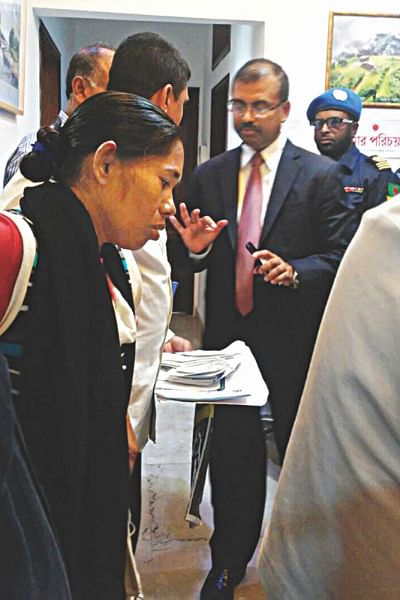Prioritising our female migrant workers

Maksuda Begum, a female migrant worker in Lebanon, who had two tumors in her stomach and was suffering from kidney complications for a long time, breathed her last in a hospital in Beirut on January 16. From being abandoned by the family she was working for to being neglected and maltreated by officials of the Bangladesh embassy in Lebanon, the 35-year-old migrant worker's desperate pleas to repatriate her to Bangladesh fell on deaf ears and her life was eventually cut short.
Not even a month has passed since Maksuda's heartbreaking story came to light and we are faced with yet another tale of a female migrant's unspeakable ordeal in Malaysia. 20-year-old Bithi (not her real name) left for Malaysia 12 days ago, only to be targeted by a human trafficking gang and sexually abused over 20 times in four days by eight men. Bithi fled the traffickers and with the help of Ain o Salish Kendra and Tenaganita, a Malaysian human rights organisation, was able to return to Bangladesh on Monday morning.
These are only a few of countless cases of the horrific abuse and torture faced by Bangladeshi female workers abroad. Despite more and more women participating in the labour force overseas and bringing in huge sums of remittances, our female migrants largely remain vulnerable to exploitation and abuse. Whereas countries such as Sri Lanka, Nepal, India, Indonesia, Philippines and Ethiopia have vehemently denounced abuse faced by their workers abroad and have taken steps to protect their rights, Bangladesh remains an outlier in the region in terms of ensuring the rights of her migrant workers.
In 2015, Indonesia announced a permanent ban on sending women as domestic help to the Middle East after reports of widespread abuse and the execution of two Indonesian maids in Saudi Arabia. But around 900 Indonesian women went to the UAE last year after the Indonesian embassy in Abu Dhabi introduced a pilot system of 'outsourced model' in mid-2016 in which men and women can only be recruited through recruitment companies authorised by the embassy for seven categories of work. Conditions imposed by Indonesia include AED 1,200 minimum salary, eight-hour working time daily, and the right to approach the labour court in the event of a dispute. India has also ordered that recruitment of all female workers who hold Emigration Clearance Required (ECR) category passports be done by seven official agencies only. In August of last year, the government of India banned recruitment by private agents for overseas jobs under ECR category. The Philippines recently negotiated a minimum salary of AED 1,500 for workers going to the UAE as housemaids, lifting a ban that they had imposed in 2014.
The dehumanising plight of women migrant workers like Maksuda and Bithi is caused by this very lack of clear mechanisms of recruitment and a failure to delineate our conditions to ensure our workers' safety as the country-of-origin before we send our workers abroad. In fact, their exploitation starts right here at home, where recruitment agencies openly flout laws charging workers way beyond government-set limits, costing them an arm and a leg. For instance, the Ministry of Expatriates' Welfare and Overseas Employment fixed the cost at Tk 165,000 for a worker to go to Saudi Arabia but jobseekers end up paying as much as an exorbitant Tk 1,000,000.
For our female migrant workers, whose primary motivation to go abroad is due to economic purposes, full economic emancipation is rarely achieved given the often inhumane conditions they are forced to work in—from being denied salaries to having their passports confiscated to being verbally and sexually abused.
Given the huge demand for low skilled female workers, particularly in the Middle East where there is a huge demand for domestic workers, it is high time that the government prioritises people over remittance and recognises the leverage that it has and capitalises on it by bargaining for increased wages, insurance, working hours, etc., following in the footsteps of countries like Indonesia, India and Philippines. The recruitment of low skilled workers for overseas jobs by private agencies, which are rarely strictly monitored, needs to be replaced by official agencies authorised by the government. Furthermore, the low skilled nature of our female workforce abroad—women hailing from rural backgrounds with little to no education—makes it all the more necessary for the Bangladesh government to put in place stringent restrictions and conditions upon receiving countries compelling them to respect our workers' rights.
The writer is a member of the editorial team, The Daily Star.

 For all latest news, follow The Daily Star's Google News channel.
For all latest news, follow The Daily Star's Google News channel. 



Comments